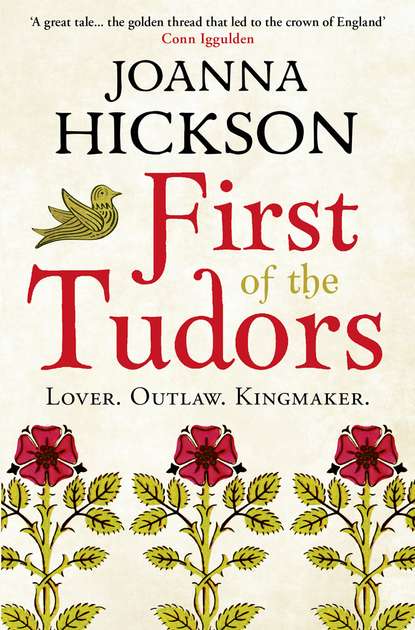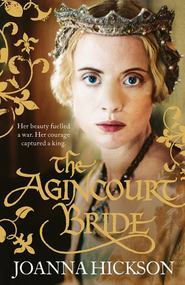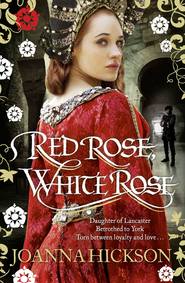По всем вопросам обращайтесь на: info@litportal.ru
(©) 2003-2024.
✖
First of the Tudors
Настройки чтения
Размер шрифта
Высота строк
Поля
I cringed inwardly. Maredudd was the salt of the earth and as solid as a doorpost but tact was not his strong point. Fifty years ago there had been a battle at Shrewsbury in the Welsh March when the present king’s father had slain the famous knight Hotspur and put an end to a rebellion led by my father’s ancestor Owain Glyn Dŵr, who had subsequently fled to the wilderness of Yr Wyddfa.
Owen’s brow creased alarmingly. ‘Why would my sons crow about a disaster that befell their father’s godfather?’ he cried, flushed and perhaps also a little excited by the rich malmsey. ‘Glyn Dŵr was a great man and a learned one. Not a man to be denigrated in my hearing.’
Edmund selected a dried plum, unperturbed. ‘I fear I know nothing of all that,’ he told Maredudd, dipping the fruit in cream as he spoke. ‘Our tutors taught us only ancient history.’
‘And poetry,’ added Jasper in an apologetic tone. ‘Now if you were to ask us to recite some Virgil one of us might oblige.’ He looked pointedly at Edmund but his brother ignored him, chewing contentedly on his plum, perceiving no need for a tactful change of subject. Jasper clearly did and turned to me to provide it. ‘What were you telling me, cousin Jane, about walking the sheep to the high pasture?’
Before I could answer Maredudd spoke up from the fire, on which he was heaping more windfall branches gathered from the nearby woods. ‘We were hoping to start out tomorrow but perhaps you have changed your mind now, Father?’
Hywel glanced across at him and frowned. ‘No, I have not. We need to start tomorrow to be back in time for Bethan’s baby. We cannot leave any later.’
‘Surely Bethan is not going with you!’ exclaimed Edmund, clearly alarmed at the thought.
I hid a smile behind my hand and my father roared with laughter, while Edmund reddened with chagrin. ‘No, no!’ Hywel exclaimed. ‘Of course not! Do you think we are Irish gypsies to birth our cubs in the bracken? Gwyladus and Emrys will stay here with Bethan and we will not be away more than two or three days. The babe is not due for a sennight yet.’
I glanced at Bethan then, realized she was drooping in her chair and decided I should take her in before she fell asleep. When I stood up I was surprised to see Jasper follow suit.
‘I will light your way, Jane,’ he said, reaching for a lantern.
In the end we had to half carry Bethan between us, so sleepy had she become, and I decided it would be best to move one of the pallets from the byre and lay her down on the floor of the dairy, thinking that if she needed to relieve herself in the night, as she often did in her present condition, she could simply wander outside to the latrine. When I had finished making her comfortable and she had fallen into a deep sleep I found Jasper waiting for me on one of the stone benches built against the front wall of the house, the lantern at his feet casting his honest, open face into mysterious shade. The moon had risen, spreading its pale light across the open expanse of the yard and turning the shadows inky black.
He patted the bench beside him. ‘Please sit with me a while, Jane. Our fathers talk too much of times gone by. I would like to learn about your life here and now. I think Bethan cannot be much help in the house. She seems a little – simple, or am I being unkind?’
I bit my lip. We did not like to discuss Bethan’s condition with strangers but although he had no Welsh and clearly knew nothing of our ways, I discerned a warm heart in Jasper, which gave me confidence in his discretion. After all, however many times removed, we were cousins – family.
I sat down, careful to leave a respectable distance between us. In the moonlight he looked younger, more like one of my brothers than an esquire of the king’s household, which I now knew him to be. ‘No, you are not unkind, sir; you are perceptive. Bethan is simple but she loves my father and shares his bed willingly. It is not her fault that she has no great domestic skills. She cannot cook or make bread or cheese, although she can churn butter if you stop her at the right moment. She cannot recognize one herb from another or remember their properties and she cannot tell a mark from a groat. But when she is not great with child she can weed the vegetable garden, milk the cows and goats, feed the poultry and collect the eggs; she loves to tend the orphaned lambs and calves and if I set it up for her she can turn a spindle for hours.’ I gave him a cheerful smile. ‘So you see she is far from helpless, and there is also Mair who is our dairymaid, who lives in the village by the shore and fetches and carries and makes the pottage.’
The sound of the stream that ran fast-flowing through the wooded vale beside the house filled the silence between us agreeably. The vale and the stone-walled fields surrounding the policies were all bathed in milky moonlight. ‘Our grandfather chose well when he built here,’ I told him. ‘The stream gives us milling-power and clean water, we have wool for weaving, grain to make bread and ale, and fat for lamps and soap. The sheep give us fleeces to sell to the monks, we have fish in the sea, meat on the hoof and crops in the fields. Between us we make most things we need and I keep the accounts and the recipes. Our household works quite well. You will see if you stay a while.’
‘I suspect that it works because you toil from dawn to dusk, Jane. And where and when did you get an education, which you clearly have?’
‘That was due to my mother. She spent her girlhood in a convent and taught us all to read and write and reckon. I am trying to ensure that Evan learns now but it is not easy, especially at this time of year when he is needed on the land. In winter it is easier to keep him at his letters. Our mother intended him for the priesthood but I cannot imagine that happening now. He is bright but not at all bookish.’ I knew I was talking too much but the words just seemed to spill out of me.
Jasper screwed up his face and shook his head in exasperation. ‘I feel I should remember your mother. Her name was Agnes was it not? But tragically I cannot even picture my own. Edmund says he can but if so he does not describe her very well. He makes her sound like a royal doll, which I am sure she was not.’
I felt a stab of pity for him. My memories of my mother were so vivid that sometimes when I was quietly sewing I felt she was sitting at my shoulder. ‘My mother always spoke of yours as an angel. There is no doubt that she was beautiful, whereas mine was like me – I think homely is the word.’
Jasper gave a derisive snort. ‘In my vocabulary homely is a polite word for ugly – and that you are not, Jane! I would say that comely is the proper word – or pretty – certainly attractive! With sweeping eyelashes like yours how could you be anything else?’
I dropped my head, hoping the white glare of moonlight would disguise the sudden colour that rushed to my cheeks. Compliments did not flow freely in our family and my reaction to Jasper’s was involuntary and regrettably rather gauche. ‘Not beautiful anyway,’ I muttered, clenching my hands together in my lap.
He made another dismissive noise. ‘Huh! I do not think beauty always begets beauty, Jane. Look at Edmund and me for instance. He has our father’s bronze good looks, whereas I am blessed with ginger hair and ruddy cheeks. My mother called me Jasper after the dark-red bloodstone in her ring and I imagine she thought the name, like the gemstone, would bring me luck. A younger son always needs luck, does he not?’
With his fresh, freckled complexion and brilliant blue eyes, which even the moon’s glare could not bleach, I wanted to say that he appeared more than comely to me but shyness prevented it. Instead I said, ‘You remember that much about her anyway.’
‘No, I do not remember that; Mette told me.’
‘Who is Mette?’
‘A very bright and forthright lady who knew both our mothers well. She is an old lady now but in some ways you remind me of her.’
Regrettably I have a mercurial temperament and abruptly my mood changed from shyness to indignation. ‘I remind you of a blunt old lady? Well, thank you indeed, sir!’ I stood up and made him a sudden curtsy. ‘Please excuse me, it is time I chased Evan to bed.’
I knew I was being rude to a guest but I could not help myself and left him frowning. Moments later I heard footsteps behind me; his voice in my ear sounded contrite. ‘I said bright, not blunt, Jane! And Mette is probably the woman I admire most in the world.’
It was not until later, curled up sleepless on my pallet by the hearth, that I appreciated the compliment hidden in Jasper’s words.
3 (#ulink_ec05ea3e-e393-5069-bed9-1925c1b6e2a1)
Jasper (#ulink_ec05ea3e-e393-5069-bed9-1925c1b6e2a1)
The Royal Progress; Westminster & Greenwich
SWEET JANE’S BONNY FEATURES were to become a recurring image in my mind throughout the year that followed, particularly those long, sweeping eyelashes shading her deep brown-velvet eyes. Certain memories made particularly vivid returns. In blessedly balmy weather we had shared the rustic delights of shepherding Hywel’s flock of sheep up to the high pastures and the picture of Jane, in a straw hat and long boots, with her skirts tucked up and a shepherd’s crook in her hand, made frequent visitations in my quieter moments. Later, on our return to Tŷ Cerrig, I had witnessed her handling the birth of Bethan’s baby, when she chased all the men out of the house and set about supervising the midwife, cheering the mother and reassuring the grandmother, all with seemingly unruffled efficiency. And meanwhile I managed to pick up a few words of Welsh, at least enough to identify a mab from a merch, which is to say a boy from a girl. I had little experience of females of any age but the sight of this smiling fourteen-year-old merch emerging from the front door of the farmhouse to present her father with his newborn daughter remained with me for months, inspiring comparison with church images of the Madonna and Child.
Walking our horses to the field one day Edmund had been scornful of my friendship with Jane, pointing out to me that a relationship with a Welsh farm-girl, especially one whose grandfather had been outlawed for rebelling against the crown, would not be one to mention at court. ‘Enjoy her company while we are here, Jas, bed her if you will, not that beds seem to abound in this part of the world, but for pity’s sake keep silent on the subject of Jane when we return to Westminster.’
I worried about Edmund’s attitude towards females. He did not seem to have absorbed any of the rules of chivalry drummed into us during the lessons on Arthurian legend, which the king had insisted should be part of our preparation for knighthood and which laid particular stress on respect for women. Edmund was always careful to impress our tutors with his grasp of Latin verse and philosophical texts but his moral code was that of the alehouse.
I angrily rejected his implication that I had lecherous designs on Jane. ‘The only bedding I have done here is strawing down the horses, brother – and for pity’s sake will you please stop calling me Jas!’
‘Temper, temper!’ he cried. ‘What does plain Jane call you then? Rust-head?’
‘No, but I will tell you what she calls you. Pretty boy! You frightened the sheep in your bright red doublet and yellow hose – you should have left them in London.’
‘And you should leave those mud-coloured rags of yours in Wales,’ he retaliated. ‘Along with your Welsh words and your bumpkin shepherdess – Jas!’ He had to dodge under his horse’s neck to avoid my bunched fist.
When we did return to court, however, it was not our clothes or my language which sparked a bout of teasing from our fellow squires but the tanned faces we had acquired after three months in field and saddle, weeks which we had both greatly enjoyed, no matter how much Edmund protested that he had stagnated in the ‘rural backwaters’ as he called West Wales.
But there was no prospect of a return to Wales. Memories of Jane were all I was ever likely to have, for now that Edmund and I had both reached our majority our brother the king often summoned us into his company, significantly more than the other household squires. I suspected that this was due to prompting by Queen Marguerite, who seemed to relish the notion that we were first cousins; her father’s sister, Marie of Anjou, was also our aunt by marriage, being queen to our late mother’s brother, King Charles VII of France.
‘But we cannot make anything of this in the court,’ she warned privately, in what I considered her rather charmingly broken English, ‘because King Henry is still le Roi de France, however successful are the armies of our Uncle Charles in Normandy and Maine.’
It was a moot point. According to the peace treaty that had married our mother to Henry’s father, he was officially king of France as well as England. But his commanders were gradually and ingloriously losing the vast swathes of French territory conquered by the fifth Henry and the peace of the realm was seriously threatened by hordes of displaced soldiers who, having settled in Normandy and Maine with their families, were now forced to flee the invading armies of King Charles and return to England, where many of them roamed the shires, homeless, penniless and desperate, stirring up trouble. This series of military setbacks had also drained the royal coffers and caused a dangerous split in the ranks of the English nobility. Earlier in the year the king’s distant cousin, Richard, Duke of York, who publicly lamented these failures, had been banished from court for bringing an army to London, demanding to be given command of the French wars and named as Henry’s heir.
It was Queen Marguerite who told us that she and the king were going on a Royal Progress and Henry desired that Edmund and I accompany them, not as his household squires but as his brothers. ‘Henry will dispense justice to all the poor people who have been robbed and attacked by these renegades from France,’ she explained.
This was undoubtedly an honour, intended to give us an intimate knowledge of our brother’s duties and beliefs. We were to lodge near the royal apartments and share the private solar.
I learned a great deal during that Progress about the way the king’s justice was dispensed, and discovered the enormous discrepancy between those nobles who were actively involved and compassionate overlords and those who dealt with their tenants at third and fourth hand, often using unscrupulous methods of extracting their rents and revenues.
I also found out a great deal about the king and queen themselves. They treated each other with unfailing courtesy but little apparent affection; the private time we spent with them significantly lacked laughter or casual exchange of the kind I expected between two people who had been joined in matrimony for more than six years. In fact, I felt there was a constant, underlying tension, which puzzled me. Of course love was no prerequisite in a dynastic marriage such as theirs but Henry scarcely seemed to notice that Queen Marguerite was undeniably lovely, with an exotic beauty and a graceful figure that elicited furtive but appreciative glances from most of the young men about court. He refrained from any comment on her dress or appearance unless he thought it too elaborate or excessively extravagant. He himself dressed more like a cleric than monarch despite Marguerite urging him to adopt the bright fabrics and brilliant jewels she considered appropriate to the royal state.
She sought our support in this endeavour. ‘The people expect splendour of their king, do you not think? Edmund – you must agree for you are always á la mode. Perhaps you might advise his grace on what the nobility are wearing? I notice that the hems of the young courtiers’ gowns are getting shorter, their hose is more colourful and their jewellery more lavish but I cannot persuade Henry to adopt this style. He dresses as if every day were Vendredi Saint.’
Nevertheless Henry continued to avoid splendour, even when attending the opulent feasts provided by our hosts during the Progress, all of them anxious to please their sovereign, hopeful of obtaining some reward. These occasions provided opportunities for dancing and masking, when many young male courtiers chose to display their physiques, stretching their hose tightly over their thighs and exposing more leg than would be wise in cold weather. King Henry certainly enjoyed a mask, especially if it was based on a biblical theme but his habit was to retire to his private chamber before the evening entertainment became too boisterous.
Usually and much to Edmund’s vexation, he asked the two of us to retire with him. Henry then chose to drink small ale and talk over the events of the day, such as the judicial cases he had heard at the local assizes or a visit he had made to a religious shrine. As strains of dance music drifted through open windows, Edmund’s feet would start tapping out the rhythm, while he strove to preserve an expression of rapt interest in the king’s discourse. I confess that I was often guilty of this myself and reminded of the countless times our greybeard tutors had droned on about the Rule of St Benedict or the writings of St Gregory while beams of sunshine beckoned us outdoors to the joust or the hunting field.









